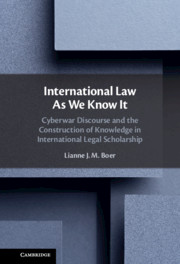 International Law As We Know It
International Law As We Know It Published online by Cambridge University Press: 01 October 2021
This chapter takes a step closer to legal writing on Article 2(4) and cyberattacks, and considers the use of consensus claims: specifically, claims that there is 'general acceptance' of, 'unanimity' on, or 'a majority view' with regard to the meaning of the prohibition as armed force. It asks what is invoked when these kinds of claims are made, and seeks to account for what consensus claims signify in legal writing. The chapter then proceeds by looking at the footnotes following these claims. The ‘sources’ these footnotes list seemingly function to substantiate the consensus claim. However, as shown in the chapter appendix, in order to support their consensus claims scholars largely refer to the same publicists. Using the notion of “concept symbols” as coined by Henry Small, the chapter seeks to account for the function of these references to the most-cited scholars, and how they turn into the bearers of majority opinion. The chapter concludes that even though one single reference can appear to be quite innocuous, when considered as a more widespread practice it seriously impacts who gets a say – and thus, ultimately, what we know – in international law.
To save this book to your Kindle, first ensure [email protected] is added to your Approved Personal Document E-mail List under your Personal Document Settings on the Manage Your Content and Devices page of your Amazon account. Then enter the ‘name’ part of your Kindle email address below. Find out more about saving to your Kindle.
Note you can select to save to either the @free.kindle.com or @kindle.com variations. ‘@free.kindle.com’ emails are free but can only be saved to your device when it is connected to wi-fi. ‘@kindle.com’ emails can be delivered even when you are not connected to wi-fi, but note that service fees apply.
Find out more about the Kindle Personal Document Service.
To save content items to your account, please confirm that you agree to abide by our usage policies. If this is the first time you use this feature, you will be asked to authorise Cambridge Core to connect with your account. Find out more about saving content to Dropbox.
To save content items to your account, please confirm that you agree to abide by our usage policies. If this is the first time you use this feature, you will be asked to authorise Cambridge Core to connect with your account. Find out more about saving content to Google Drive.